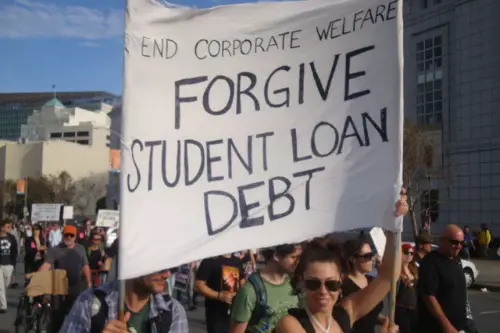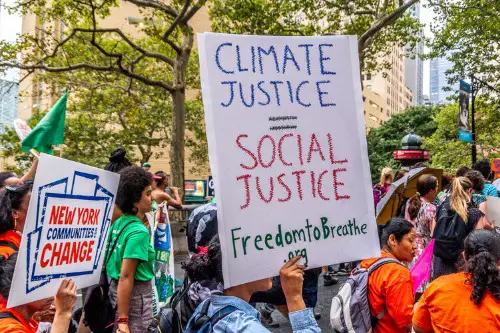1. SNAP Work Requirements

Food assistance for low-income Americans is crucial, and SNAP (food stamps) plays a big role. But there are strict work requirements for able-bodied adults without dependents, and those can be difficult to meet—especially in areas with few job opportunities. Miss a few reporting deadlines or work less than 20 hours per week, and you can lose benefits entirely. This disproportionately affects people with unstable gig work or caregiving responsibilities.
Supporters claim it incentivizes employment, but in practice, it punishes those already struggling. The policy assumes people aren’t working by choice rather than circumstance. In states with limited public transportation or childcare options, meeting the requirements can be nearly impossible. It’s a harsh trade-off dressed up as responsibility.
2. Student Loan Forgiveness (With Strings Attached)

On the surface, student loan forgiveness sounds like a dream come true for millions of borrowers. But many forgiveness programs, like Public Service Loan Forgiveness (PSLF), are riddled with eligibility hoops that make it hard to actually benefit. Borrowers must make 120 qualifying payments on a qualifying plan while working full-time for a qualifying employer—and one missed detail can reset the clock. As of just a few years ago, denial rates for PSLF hovered around 98%.
So while the idea is progressive—relieving crushing debt for those in service professions—the execution makes it nearly impossible for many to qualify. The paperwork is dense, and servicers often give conflicting advice. There have even been lawsuits over mishandling of applications. It’s more of a bureaucratic maze than a financial relief valve.
3. Right to Repair (Sort Of)

You might’ve heard that Americans now have the “right to repair” their own devices, especially with recent policy pushes in states like California and New York. But most of these laws don’t actually force companies to make repairs easy—they just have to allow access to tools and manuals. That still doesn’t guarantee parts will be affordable, or that your iPhone won’t be bricked if you don’t use an authorized service. Apple, for example, often restricts repairs through proprietary software locks.
It’s a policy that sounds consumer-friendly but still leaves the ball in the manufacturers’ court. These laws often have broad carveouts for specific industries, like medical or agricultural equipment. And many major corporations continue lobbying to weaken enforcement. So yes, you can repair your stuff—if you can afford the tools and don’t mind voiding your warranty.
4. The Affordable Care Act’s Employer Mandate

The ACA’s employer mandate was designed to ensure that full-time workers get health insurance. But to avoid offering coverage, many employers simply reduced worker hours to keep them below the 30-hour-a-week threshold. So instead of getting health insurance, workers got part-time gigs and fewer benefits. It’s a textbook case of unintended consequences.
The mandate aimed to close insurance gaps but ended up widening employment precarity. Companies found a way around it by gaming the definition of “full-time.” Meanwhile, workers were left with fewer hours and still no coverage. It highlights how policy intent and corporate response don’t always align.
5. Clean Energy Tax Credits (Favoring the Rich)

The U.S. offers generous tax credits for things like electric vehicles and solar panels, which sounds great for fighting climate change. But many of these credits primarily benefit higher-income households who can afford to make the upfront investment. If you don’t have $30,000 for a new EV or $15,000 for rooftop solar, the tax break does nothing for you. It’s a progressive policy in theory, but regressive in practice.
The Inflation Reduction Act tried to expand access, but complications around eligibility and manufacturer limitations still create barriers. Lower-income families often rent and can’t install solar, or they lack the tax liability to benefit from credits. So the policy effectively subsidizes wealthier Americans going green. Meanwhile, those who’d benefit most from lower energy costs are left out.
6. Housing Vouchers That Don’t Guarantee Housing

Housing vouchers like those from the Section 8 program are meant to help low-income families afford decent rentals. But landlords can—and often do—refuse to accept them, especially in competitive housing markets. So even if you qualify for a voucher, you might spend months (or years) unable to actually use it. The result is that many vouchers expire before families find a home.
The federal government may promise rent help, but local realities make that promise hollow. Some cities have tried to ban voucher discrimination, but enforcement is weak. Plus, the supply of affordable units is dismal in many areas. It’s a lifeline that doesn’t always reach the drowning.
7. Charter School Expansion in Low-Income Areas

Charter schools were originally pitched as a way to innovate and improve education in underserved communities. But in many cities, their growth has siphoned off funding from public schools, which are then left with fewer resources and more high-need students. Some charters cherry-pick students or use harsh discipline policies to keep performance stats up. That leaves the public system with more challenges and less money to meet them.
Proponents argue parents deserve choice, and that’s not wrong—but the playing field isn’t even. When charters don’t serve English language learners or kids with disabilities at the same rates, the public system bears the burden. It turns education into a zero-sum game. The promise of better schools becomes a matter of who gets left behind.
8. Criminal Justice Reform That Still Funds Police

Criminal justice reform has gained traction, especially after high-profile cases of police violence. But many reform bills include increased funding for law enforcement alongside community initiatives. For example, some reforms advocate for body cameras or de-escalation training—but still boost police budgets. It’s progress with one hand, reinforcement with the other.
The language is reformist, but the outcome often supports the status quo. Instead of divesting from over-policing, we end up investing in “better policing.” That’s not what many activists called for, and it often doesn’t address root causes. It’s a compromise that satisfies no one fully.
9. Paid Family Leave—But Only If You Qualify

The U.S. is famously behind on paid family leave, and recent pushes at the state level have made headway. But many of these programs exclude part-time workers, recent hires, or gig workers entirely. Even when covered, benefits are sometimes too low to live on—leaving new parents in a bind. The policy may exist, but access is uneven and incomplete.
California, for example, has had paid leave since 2004, but it’s based on your earnings history and doesn’t cover everyone. That means some of the most vulnerable workers are still left without support during critical family moments. The headline sounds great—but the details show just how patchy the safety net really is. It’s family-friendly in name, not always in practice.
10. Federal Minimum Wage Exemptions

Everyone knows the federal minimum wage is $7.25 per hour, but fewer people realize not everyone even gets that. Tipped workers can be paid as little as $2.13 an hour, depending on state laws. If tips don’t make up the difference, employers are supposed to make it up—but enforcement is spotty. And workers often don’t know their rights.
This carveout, created decades ago, disproportionately affects women and people of color in service jobs. It means the lowest earners in the economy are also the least protected. So while minimum wage increases are celebrated as wins for workers, millions are still excluded. It’s a loophole big enough to swallow a whole industry.
11. Free Community College (With Fine Print)

Some states and proposals promise “free community college,” and that’s a huge step forward for accessibility. But most of these programs are “last-dollar” scholarships, which only cover tuition after other aid is applied. That still leaves students responsible for fees, books, transportation, and living costs—major barriers for many. The word “free” does a lot of heavy lifting.
Additionally, students often have to meet GPA and enrollment thresholds to keep the benefit. If you drop below a 2.5 or go part-time, you might lose your funding. For people juggling work, family, and school, those conditions aren’t easy. It’s more of a discount than a ticket to opportunity.
12. Environmental Justice Grants That Rarely Reach Communities

Federal programs like Justice40 aim to direct 40% of climate and infrastructure funds to disadvantaged communities. But accessing those grants often requires grant-writing expertise, matching funds, and complex reporting. That leaves many grassroots groups out in the cold, while large NGOs or city governments swoop in. The money exists, but the gatekeeping is real.
Communities most impacted by pollution often lack the administrative capacity to compete. So while the intention is commendable, the follow-through misses the mark. The communities the policy is about often have the least say in how it’s implemented. It’s equity on paper—but bureaucracy in action.
13. Background Checks for Guns That Don’t Catch Everything

Universal background checks are a popular and seemingly common-sense gun control measure. But the U.S. system has huge loopholes—private sales and gun shows often don’t require them under federal law. And even when checks are done, databases are riddled with outdated or incomplete information. Some mass shooters have legally purchased firearms they shouldn’t have been able to.
The policy polls well because it sounds airtight, but it isn’t. Enforcement varies widely by state, and federal legislation has been stalled for years. Meanwhile, technology and data-sharing limitations reduce effectiveness. So yes, we have background checks—but they’re far from universal or foolproof.
This post 13 Policies That Sound Progressive Until You Read the Fine Print was first published on American Charm.


